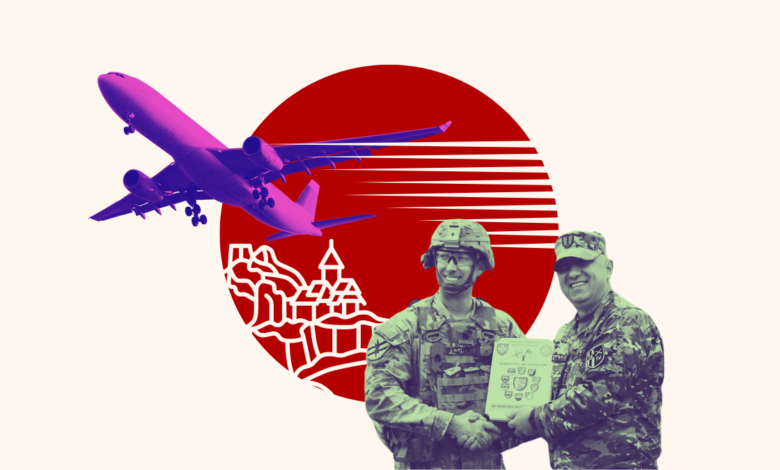
Prime Minister Irakli Kobakhidze is on a campaign trail, distributing largesse and showcasing progress. One of the Georgian government’s pet projects of this election season is the prospect of Tbilisi’s new international airport, which PM Kobakhidze advertised at the government session on April 8. But Georgia’s military and security analysts say the controversial project would undermine Tbilisi’s defenses, deplete the army’s combat-readiness, and effectively end one of the key NATO-Georgia projects.
PM Kobakhdize said the new international airport, located 15 km further away from the current one, could accept 19 million passengers per year and be completed by 2029. It remains unclear why the government projects such an explosive growth: according to the Civil Aviation Agency, in 2023, the Tbilisi International Airport served 3,7 million passengers, a tad short of pre-COVID figures. Irakli Nasidze, an aviation expert who spoke to Radio Liberty, says it is “too ambitious” to project the five-fold growth in passenger turnout by 2050, a figure invoked by the Minister of Economy, Levan Davitashvili.
Yet, economic projections aside, the Vaziani Airport undeniably plays an important security role.
Constructed in the 1940s, Vaziani housed a Soviet aviation wing and also served as a test airport for Tbilisi’s Soviet-era “31st Factory,” which manufactured Su-25 ‘Frogfoot’ close support aircraft. These days, the base is home to Georgia’s crucial military infrastructure.
It houses Georgia’s 4th Mechanized Brigade, one of the most combat-ready detachments of the army tasked with shielding the capital. The Combat Training Center (CTC) of the NATO-Georgia Joint Training and Evaluation Centre (JTEC) is also located there. It forms an important element in ensuring the interoperability of Georgian troops with NATO.
Military security expert Lasha Dzebisashvili tells us that “together with its landing strip, the Vaziani base forms a unique facility for battalion-level combined-arms training.” For this reason, the base, along with its training and shooting grounds, has been used over the years for NATO and US-led training.
Starting the construction on this location would “at the very least, require a termination of a shooting range,” tells Temur Kekelidze, former deputy chief of Georgia’s mission to NATO, Ambassador to Cyprus, currently with the Georgian Strategic Analysis Center (GSAC), a think tank.
The absorption of the military airport by the civilian infrastructure “will definitely cripple the base, delivering a heavy blow to the national security,” Kekelidze argues. Dzebisasvhili also thinks that “relocating the 4th Mechanized Brigade elsewhere would – at least during the transition – significantly undermine the capital’s defenses.” Pointing at the recent experience of Ukraine, analysts point to the critical importance that Hostomil airfield, near the capital, played both in Russian plans to invade the country and Ukraine’s capacity to defend it. Dzebisashvili says Vaziani airfield is also critical in promptly securing allied support in case of a critical military or natural catastrophic contingency.
Relocating the infrastructure is also expensive. Former minister of defense, Tinatin Khidasheli, told Radio Liberty that Georgia’s partners invested “several billions of dollars” in various facilities during the past 30 years.
That is a significant consideration, which, it seems, was not included in the government’s calculations. While advertising the project, PM Kobakhidze said the expansion of the existing airport was estimated at 900 million GEL. In contrast, the costs for the estimated new one, in Vaziani, stood at 1 billion 260 million USD. He said the difference was worth it since, even after the expansion, the old airport could not receive more than 15 million travelers per year.
Yet, should the additional costs of relocating the Vaziani base and facilities clearly make the cumulative costs for the new airport prohibitive? We approached the Ministry of Economy for comment and were told, “Nothing will change in relation to the military infrastructure; everything will remain as it is. Everything is calculated in a way that the airport and the military infrastructure won’t overlap.”
When questioned in parliament, current Defense Minister Irakli Chikovani similarly said, “The specialists said very clearly, the Vaziani airport modernization presents no threat.” He added, “Our training base won’t affect the flights.” He did stress, though, that this was “a preliminary position.”
Yet, military experts tell us it is nearly impossible for the live artillery and aviation shooting range to be compatible with the normal functioning of the civilian airport.
The discussion about the airport started in 2023, and the concerns were voiced already then. Juansher Burchuladze, defense minister at the time, said that “expert studies will be done in the course of 2024” and led by the Ministry of Economy to evaluate “benefits or negative impact, including from the military standpoint.” Even though the government says the economic study was completed with the support of the Asia Development Bank (ADB), the report has not been made public. When approached during the writing of this article, the Ministry of Economy told us it couldn’t share the completed feasibility study with us.